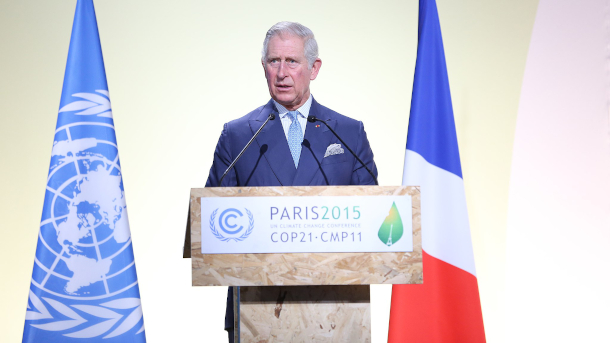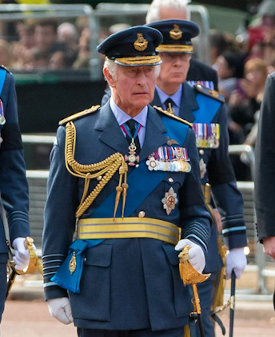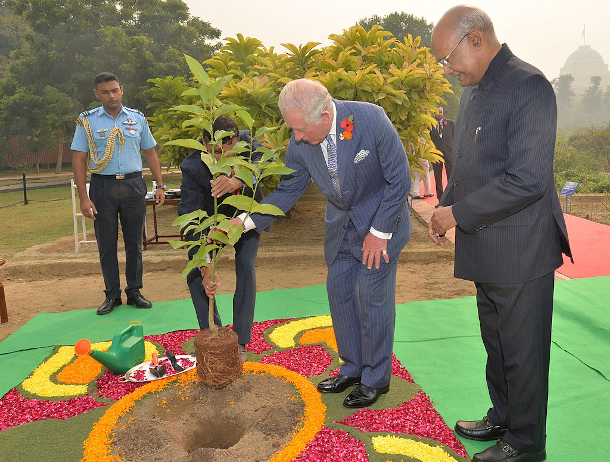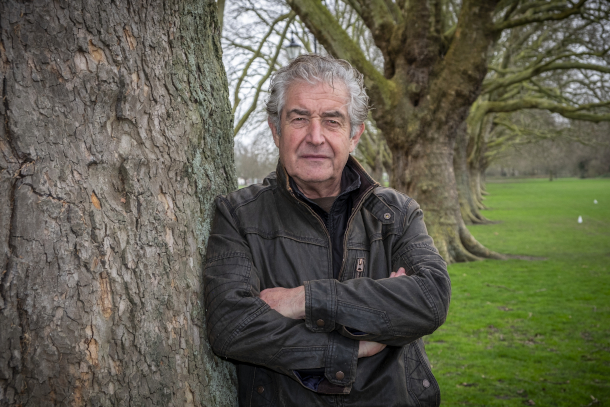The Green King
Air Date: Week of September 16, 2022

King Charles III, who was then Prince of Wales, addressed the opening of the COP21 UN climate conference in Paris in 2015. (Photo: UNclimatechange, Wikimedia Commons CC BY 2.0)
King Charles III, the former Prince of Wales, has acceded to the throne and brings with him a lifelong passion for nature and environmental causes. His longtime advisor and co-author Tony Juniper joins Host Steve Curwood to discuss His Majesty’s contributions on environment and climate, how that might influence him in his new role as King, and the passing of the activist torch to his son William, the new Prince of Wales.
Transcript
[THEME]
BASCOMB: From PRX and the Jennifer and Ted Stanley studios at the University of Massachusetts Boston, this is Living on Earth, I’m Bobby Bascomb.
CURWOOD: And I’m Steve Curwood.
KING CHARLES III: This is a call to revolution. The Earth is under threat. It cannot cope with all that we demand of it. It is losing its balance and we humans are causing this to happen.
CURWOOD: That’s His Majesty King Charles III reading the opening words of his 2010 book Harmony: A New Way of Looking at Our World, back when he was still the Prince of Wales.
KING CHARLES III: Revolution is a strong word and I use it deliberately. The many environmental and social problems that now loom large on our horizon cannot be solved by carrying on with the very approach that has caused them. If we want to hand on to our children and grandchildren a much more durable way of operating in the world, then we have to embark on what I can only describe as a “sustainability revolution” – and with some urgency.
CURWOOD: Now that his majesty King Charles III has ascended to the throne, he is perhaps the most prominent environmental advocate to become head of state for a major world power. Tradition suggests the new king will not be as publicly outspoken as he was as crown prince, but now may well use his new powers to advance the causes of nature and environmental protection from behind the scenes. King Charles co-authored “Harmony” with Tony Juniper, a former head of Friends of the Earth England who for decades has advised the new sovereign on the environment and climate. Tony now chairs Natural England, a government conservation agency and joins us from London – welcome back, Tony!
JUNIPER: Lovely to see you, Steve. Nice to be back.

King Charles III processed from Buckingham Palace to Westminster Hall on September 14, 2022 for the Lying-in-State of Elizabeth II. (Photo: Katie Chan, Wikimedia Commons CC BY-SA 4.0)
CURWOOD: So, Tony, please give us a bit of the backstory on how King Charles III has made environment and climate central to his work over the years. How did he use his stature as Prince of Wales to advocate for it?
JUNIPER: It's been a remarkable contribution, looking back from the vantage point of now and the sad moment when Her Majesty Queen Elizabeth II has passed on, and he now is King. And it's a moment to reflect on not only the future, but also the past and the incredible amount of work that King Charles did as Prince of Wales on these environmental subjects, going literally back to the late 1960s, this is a long time ago. And working with him on "Harmony," it became clear that the reasons he did this and chose this path, to use his position as Prince of Wales to champion these environmental causes, it was really because of a sense of disquiet he was feeling as he was growing up during the 1950s and 60s, when you could see the world changing very quickly. The landscape literally changing before his eyes, with the removal of woodlands and hedgerows, the drainage of wetlands, the massive use of pesticides, ancient town centers being pulled down and replaced with concrete blocks. All of these and many other things began to cause him to wonder if we were on a very wrong path. And so he decided to use his position in order to raise awareness about all of these subjects. And so as time went on, it moved beyond wildlife and pollution in this country to embrace global issues, including climate change and tropical deforestation. And so the speeches and the books have been quite famous, quite rightly. But he also set up a number of organizations, charitable organizations that sought to help do the work. He's visited countless locations across the globe, where he's met people trying to make a difference and given them encouragement. And for me, as an environmentalist growing up in the 70s, Steve, one thing that really inspired me was hearing somebody from the establishment who was prepared to speak out on these subjects, because there wasn't literally anybody else. And so I think, you know, in some ways, he really is one of the most outstanding environmental leaders the world has seen.
CURWOOD: How fair is it to say that the environment has been King Charles III, former Prince of Wales, his life's work?
JUNIPER: I think it would be very fair to say that, Steve, recognizing that for him, environment is a very broad concept. And for him, the environment is not simply climate change. It's a whole range of different questions that come together in some pretty fundamental places, including around these ideas of harmony, which is what he expressed in that book that he published back in 2010, that I was lucky enough to help him with alongside Ian Skelly. And that work, I think, is a great example of the different ways in which he draws connections between all of these things, public health, the food supply, how we educate young people, the very way in which we conduct economics. All of these things, he would say, are environmental questions, and he's sought to explain them as environmental subjects as time has gone on.
CURWOOD: What was the eye opening set of experiences for him that drew him to the broad concept of the environment? For many of us, of course, it's time outside in wild or certainly natural places. But to what extent do you know about what really inspired him to begin in this direction?
JUNIPER: I think one thing that inspires a lot of environmental advocates, and certainly me, and I know to an extent him also, is a love of nature. And that love of nature comes with familiarity of the natural world. And one time on a visit to his house in Scotland, very close to Balmoral, we went for a walk by a river where he used to be taken by his grandmother, the Queen Mother, and they used to fetch water from the river in the tea pot and take it indoors, boil it on an open fire to make tea. And that connection with the natural world at an early age and in that way, which was very much linked to family and linked to great times and having moments with his grandmother, this evidently left an impression on him in terms of the importance of natural areas and the outdoors to him. And again, like many other environmentalists, once you start to develop your love of nature, then you develop this shock and horror when you see the destruction of nature. And Rachel Carson, another great environmental leader from the United States, in her case, made similar points about how an ecological awareness leads to quite painful experiences when you see what is going on. And I think that's what happened for him. Having developed this love of the beauty and the wonders of the natural world, before your very eyes, you see it being destroyed by people who apparently don't care. But basically what's going on is that they don't know. And if they don't know, what can you do? Well, you have to help them understand the consequences. And so I think it was that series of steps: of love, horror, and passion to do something about it that basically took him to where he was for so many years as Prince of Wales as this very passionate, very hardworking, very determined environmentalist. And he leaves an incredible legacy, with 50 years of that under his belt.
CURWOOD: So now, in 2022, the Prince of Wales, Charles the Prince of Wales becomes King Charles III. What can he do now to follow his concerns about the environment as the sovereign now of the UK, which, at least in my lifetime, has been fairly apolitical in public stance; certainly, Queen Elizabeth II was publicly very apolitical.
JUNIPER: The role of sovereign is different to the role of Prince of Wales. And nobody knows that more than the new King Charles III. And he has been on the record over recent times, including as recently as last week, when he came to the throne, to reinforce the idea that he knows he's now going to need to do things differently in the new role that he now occupies. But irrespective of that, I think the very fact of him having spent so long and so successfully driving forward this agenda, that it actually in some ways, it doesn't really matter whether now he is constrained. Because the role of, of sovereign, of Monarch, it's something which is about what it stands for, as much as what the holder of the role does, if that makes sense. So the very fact of him having been such a prominent environmentalist for so long, I think automatically means now that with him as the holder of that role, the embodiment of that role, then automatically, almost, it has to have an ecological dimension to it.

King Charles III, who was at the time Prince of Wales, plants a tree with Indian President Ram Nath Kovind in 2019. (Photo: Government of India, public domain)
CURWOOD: As I understand it, traditionally, once a week or so the prime minister meets with the monarch. Those are private meetings, as far as I know, never really disclosed to the public. To what extent do you think that King Charles III might take that opportunity to have comments about environment and conservation to the Prime Minister?
JUNIPER: I have no idea, Steve; nobody will know because those meetings are strictly confidential, and nothing ever leaks out either from the prime minister or the palace. And so that remains a conversation between the head of state and the head of government, and the rest of us won't necessarily know the details. But you know, if one is speculating about the role of monarch and the interests of the monarch, and the extent to which one of the things they are there to do is to warn of danger and to take the long view, then the subjects that he has been so passionately engaged with certainly will be in both of those categories: of danger factors for the realm and the planet, and very much about the long term interests of society, not just the coming weeks or the coming months or even the next few years.
CURWOOD: So now that the new Prince of Wales, Prince William, takes over, to what extent do you think he was tutored by his father in the environment? He has, of course, this challenge fund that he's already put out; he's made some speeches along these lines. What do you think will be his level of enthusiasm to address the environment and conservation?
JUNIPER: Like his father, Prince William, who now is taking on the role of Prince of Wales, has expressed quite a lot of interest in quite a range of issues: mental health, the well being of veterans, and of course, the environmental issues. And the environmental piece is coming out more strongly as time has gone on, with the Earthshot Prize being the most recent example of that. But if you look back over the recent history of all of this, you know, it's worth remembering that the Duke of Edinburgh, so King Charles's father, was also a passionate environmentalist and worked as the international president for WWF for some time, and was involved with the Wildfowl and Wetlands Trust here, which is now a more global organization working on wildlife and wetlands. He was very involved with all of those things. Actually, there was a remarkable moment here a few years ago when we had all three generations, the Duke of Edinburgh, the then-Prince of Wales, and then-Prince William coming together to launch an initiative called United for Wildlife, which was about cracking down on the illegal wildlife trade, so tiger parts and elephant ivory and some of these despicable activities that continue. The three of them came together to try and kickstart some more determined action to do something about that, which was a lovely thing to see.
CURWOOD: Fascinating. Tony, how much support is there currently now among the public in the UK for acting on nature and climate issues, and really the crisis around the climate?

Tony Juniper has been a longtime advisor to King Charles III on environment and climate matters and co-authored two books with him on the subjects. He’s currently Chair of Natural England and former head of Friends of the Earth UK. (Photo: Jason Bye, courtesy of Tony Juniper)
JUNIPER: Yeah, the appetite for action in this country dramatically transformed over the last few years. And we've had a whole raft of new policies and initiatives come from government, which reflect that very deep shift in the public mood on all of this. And, you know, Boris Johnson's government were very energetic in bringing forward new agricultural policies, new targets for curbing biodiversity loss, doing more on the net zero agenda. And I'm very much hoping that the new government will stick in that similar vein. Because like many other countries, we have a short term cost of living crisis, hopefully a short term cost of living crisis, which has diverted attention. But of course, trying to resolve that cost of living crisis through rolling back environmental action, it's a false narrative. It won't work. And also, of course, just leaves these things to get bigger for later. I think a lot of people are beginning to see that actually, the same things that we need to do for climate change are the same things we need to do to manage rising prices, recognizing now that the cheapest energy that we can get in this country is renewables. And so the idea that we can deal with the crisis by pumping more gas, it's just plain wrong, because these big questions are not going away. They're becoming very real now, in terms of the consequences that we see for people and in this country we've had an historical unprecedented drought period, which has caused big impacts on the water supply, on food production. And at the same time, we're looking at what's going on in Pakistan with the terrible effects for people there, with rocks the size of small cars coming down mountainsides in unprecedented monsoon rains. We're living in "the era of consequences," as Winston Churchill would have called it. And I think if we're going to have leaders fit for the world that we now live in, they've got to keep this front and center.
CURWOOD: Tony Juniper is chair of Natural England and longtime adviser to King Charles III, with whom he's co-authored two books on the environment. Tony, thanks so much for taking the time with us today.
JUNIPER: Steve, it was an absolute pleasure to share a few thoughts at this historic moment. Thank you.
Links
The Guardian | “Will Charles III Be as Green a King as He Was a Prince?”
Listen to our previous conversation with Tony Juniper about his book “Rainforest”
Living on Earth wants to hear from you!
Living on Earth
62 Calef Highway, Suite 212
Lee, NH 03861
Telephone: 617-287-4121
E-mail: comments@loe.org
Newsletter [Click here]
Donate to Living on Earth!
Living on Earth is an independent media program and relies entirely on contributions from listeners and institutions supporting public service. Please donate now to preserve an independent environmental voice.
NewsletterLiving on Earth offers a weekly delivery of the show's rundown to your mailbox. Sign up for our newsletter today!
 Sailors For The Sea: Be the change you want to sea.
Sailors For The Sea: Be the change you want to sea.
 The Grantham Foundation for the Protection of the Environment: Committed to protecting and improving the health of the global environment.
The Grantham Foundation for the Protection of the Environment: Committed to protecting and improving the health of the global environment.
 Contribute to Living on Earth and receive, as our gift to you, an archival print of one of Mark Seth Lender's extraordinary wildlife photographs. Follow the link to see Mark's current collection of photographs.
Contribute to Living on Earth and receive, as our gift to you, an archival print of one of Mark Seth Lender's extraordinary wildlife photographs. Follow the link to see Mark's current collection of photographs.
 Buy a signed copy of Mark Seth Lender's book Smeagull the Seagull & support Living on Earth
Buy a signed copy of Mark Seth Lender's book Smeagull the Seagull & support Living on Earth

